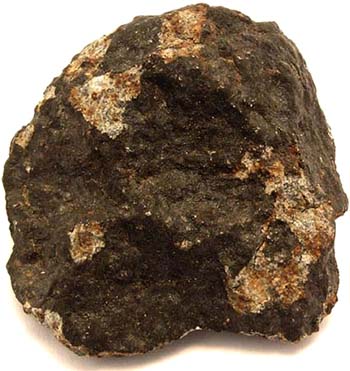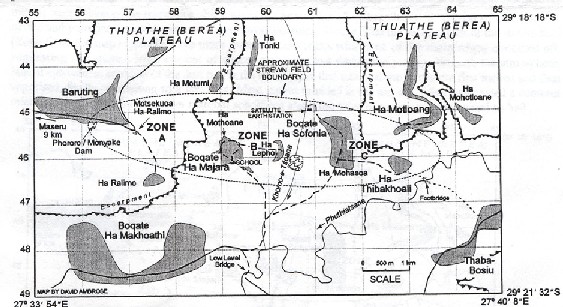


- Meteorites For Sale - Found A Meteorite? - Monthly Favourite - Meteorite Information - Classification List - Meteorite Collection - Media Centre - Home - Search - Site Map - Contact |
|
Thuathe The Thuathe meteorite fell over the Thuathe Plateau in Western Lesotho, Africa on Sunday the 21st of July, 2002 at approximately 2:49pm local time. Incredibly, this was just several hours before the Kilabo meteorite fell some 5000kms away on the other side of the African continent in Nigeria. It has since been classified as an H4-5 ordinary chondrite with a TKW of around 35-40kg. There was a massive explosion which continued at very high intensity for around 20-30 seconds. It created a shock-wave which rattled windows. It was reported that several of the stones hit buildings and objects in villages. The largest stone was estimated to weigh around 3-4kg but a curious village chief broke it open with a sledgehammer to view the interior. The strewn field was quite well documented and measures 7.4km x 1.9km. It suggests an entry angle of around 75O. I have included a map of the strewn field below which was compiled by David Ambrose, one of the main researchers in Lesotho. It comes from the paper, 'Know Your Campus, 88: Meteorite Strewn Field Defined'. I have obtained a great little 100% fusion crusted oriented specimen weighing 3.36g which you can also view below. A 25g fully crusted specimen which is listed in the National University of Lesotho catalogue is also shown.
Thuathe (H4) - 25g Individual. National University of Lesotho Catalogue No. #63 This specimen was found by Molahlehi Moloi, on the Thuathe Plateau beytween Baruting & Ha Ralimo. This piece is listed in the David Ambrose (National University of Lesotho) catalogue - a record of recovered Thuathe meteorites, showing (where known) the mass, dimensions, place found, finder's name, description, etc. of each meteorite. This piece also shows two very distinct and different fusion crusts. One is extremely smooth with deep regmaglypts, while on the other side is quite rough and has more sheen. It looks as if the smoother side may have been part of the original or initial mass's outer crust before it exploded and fragmented in the atmosphere. A scanned image of the catalogue listing is available here.
Click here to view the archive of the Monthly Favourites
|
.jpg)
.jpg)

.jpg)
